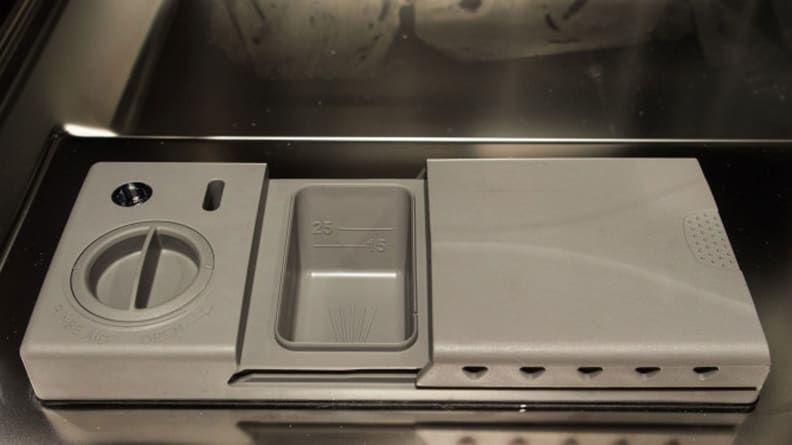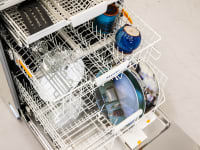What the heck is Rinse Aid, and why do I need it?
Because “drying aid” doesn’t roll off the tongue.
 Credit:
Reviewed / Johnny Yu
Credit:
Reviewed / Johnny Yu
Recommendations are independently chosen by Reviewed's editors. Purchases made through the links below may earn us and our publishing partners a commission. Prices were accurate at the time this article was published but may change over time.
You know that dishwasher detergent is the stuff that actually cleans gunk off your dirty dishes, but chances are, you probably have a more hazy understanding of rinse aid.
Maybe you’ve purchased a dishwasher and gotten a free sample of it, or noticed that your new machine warns you when you’re running low?
But, what exactly is rinse aid, and why do you want it in your dishwasher?
What does rinse aid do?
Despite its name, rinse aid actually doesn't have anything to do with rinsing your dishes.
Instead, it helps remove water from flatware, plates, bowls, and glasses. Really, it's more of a drying aid. Why don't they call it "dry aid?" We don't know, but it would have been much more accurate.
Rinse aid contains chemicals called surfactants, which lower the surface tension of water. So, instead of forming droplets, the water spreads into thinner sheets that slide off your dishes. If you’ve ever used Rain-X on your car’s windshield, you'll have a good idea of what this looks like. Ultimately, this means that your dishes will dry much more quickly.
The other perk is that rinse aid's hydrophobic—or water repellant—properties prevent your dried dishes from showing water spots, which are caused by minerals left behind as water evaporates off a surface.
In a perfect world, the water in our pipes would be pure and free of mineral content. In the real world, even water that isn’t considered “hard” still contains trace amounts of limestone or chalk.
What’s in rinse aid?
Popular brand-name dishwasher rinse aids like Cascade and Finish Jet-Dry make use of citric acid and alcohols, along with a handful of less familiar-sounding chemicals (sodium cumene sulfonate, anyone?).
The Environmental Working Group, which rates household products on safety for humans and the environment, gave both Cascade and Finish Jet-Dry a D grade. This rating is also affected by how openly the products disclose their ingredients.
However, "greener" brands like Seventh Generation and Ecover make rinse aid derived from a plant-based formula.
Their products earned B and A grades from the EWG, in large part because full ingredient lists are easy to find on their sites, and they're notably shorter than those of the more well-known brands.
Learn more about what's inside
Want to know more about what ingredients are in these products? We’ve got you covered.
Should I use rinse aid?

Whether or not you should use rinse aid depends largely on whether or not you’re happy with the condition of your dishes after a wash cycle. If you do use it, you can usually find the reservoir near the soap dispenser.
If you have soft water, your glasses are spot-free, and you’re satisfied with your dishwasher’s drying abilities, you can do without a rinse agent. But, because "wet dishes" are the most frequent complaint among surveyed dishwasher owners, you should consider giving rinse aid a try.
Alternatively, certain brands of dishwasher tablets have an “all-in-one” mixture that contains both detergent and rinse aid, saving you from buying a bottle of rinse aid every 60 loads or so. Finally, some homeowners wary of the chemicals that may or may not be lurking in commercial rinse aid have successfully solved their hard water spotting problems with regular old white vinegar.
While this might work in a pinch, it’s an especially bad long-term solution, according to David Ellerby, our chief scientist.
“I think vinegar is a bad idea overall. It's not replacing rinse aid, because chemically it does something completely different. It doesn't help to rinse or dry, it just acts as a band-aid for hard water problems.”
There are also some downsides to vinegar: “The acidity would react with alkaline chemicals in your dishwasher detergent that break down grease, so that it could reduce cleaning performance. It's also likely to be hard on rubber seals and gaskets.”
Vinegar is especially acidic, so it will eat away at your dishwasher’s interior, exacerbating wear and tear.
If you have hard water problems and want to minimize rinse aid use, you would be better off getting a dishwasher with a water softener or a whole-house water softening system.
The product experts at Reviewed have all your shopping needs covered. Follow Reviewed on Facebook, Twitter, Instagram, TikTok, or Flipboard for the latest deals, product reviews, and more.
Prices were accurate at the time this article was published but may change over time.






